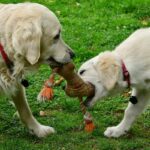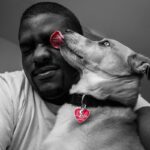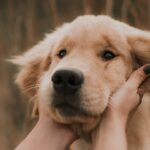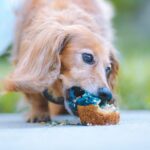Do you ever find yourself wondering why in the world dogs lick everything in sight?
I mean, seriously, it’s like they have a never-ending supply of saliva that just can’t be contained.
You could be sitting there, minding your own business when suddenly you feel a wet, sloppy swipe across your face and realize your furry friend has decided to give you a surprise lick attack.
But why do they do it?
Why does it seem like dogs have an insatiable urge to lick everything from their favorite toy to your freshly washed face?
This article will answer the question: Why do dogs lick excessively?
Why do Dogs Excessively Lick?
Dogs are famously known for their affectionate nature, and one way they express their love and care is through licking.
While an occasional lick here and there is perfectly normal behavior, excessive licking can sometimes become a cause for concern.
Here are some of the various factors that may contribute to a dog’s excessive licking habits:
1. Emotional well-being: Dogs are highly emotional creatures, and excessive licking can often be a sign of anxiety, stress, or boredom.
Just like humans bite their nails or fidget when feeling uneasy, dogs may resort to constant licking as a coping mechanism.
If your furry friend seems to excessively lick certain body parts, such as paws or legs, it might indicate localized discomfort or irritation.
Consulting a veterinarian is recommended to rule out any underlying medical issues or allergies.
2. Affection and submission: As members of a pack, dogs have a deep-rooted social structure in their DNA.
Excessive licking, especially directed towards their human companions, could be a way of showing affection, seeking attention, or displaying submission.
When a dog constantly licks its owner’s face or hands, it is often seen as a gesture of love and trust.
Similarly, if your pup is excessively grooming another pet in the household, it might indicate a strong bond or a sign of hierarchy within the pack.
3. Environmental factors: Dogs use their sense of taste as an integral part of their exploration and understanding of the world around them.
Excessive licking might simply be a result of curiosity or an attempt to gather information about their surroundings.
Additionally, environmental triggers such as a new detergent, cleaning product, or even an unfamiliar scent can lead to increased licking behavior.
Keeping an eye on any recent changes in the dog’s environment and removing potential irritants can help alleviate excessive licking.
4. Attention seeking: One of the most common reasons why dogs excessively lick is to show affection or seek attention.
Licking is a behavior that begins in puppyhood when puppies lick their mothers’ faces to solicit comfort and food.
This early experience creates a bond between dogs and licking, which they carry into adulthood.
So, if your dog is showering you with licks, take it as a sign of love and appreciation!
How Physical Issues can Trigger Excessive Licking in Dogs
While licking can be a normal part of a dog’s grooming routine, excessive or compulsive licking can indicate an underlying physical issue causing pain and discomfort.
Understanding why our furry friends engage in this behavior is crucial to providing them with the necessary care and relief they need.
One possible cause of excessive licking is skin irritation or allergies.
Dogs with sensitive skin may develop rashes or dermatitis, which can make them feel itchy and uncomfortable.
Consequently, they may resort to excessive licking in an attempt to relieve their irritation.
If you notice that your dog is focusing their attention on a particular area, such as their paws or belly, it could be a clear sign of skin-related discomfort.
Furthermore, physical pain can also be a trigger for dogs to excessively lick certain areas of their bodies.
Injuries, like sprained joints or muscle strains, can cause discomfort, leading dogs to instinctively lick the affected area as a form of self-soothing.
Moreover, dental issues, such as gum inflammation or tooth decay, can cause oral discomfort, causing dogs to lick their mouths excessively.
Regular dental check-ups and providing appropriate dental care can help prevent such issues and alleviate discomfort for our furry companions.
In order to address excessive licking in dogs, it is important to first identify the root cause.
If you suspect that your dog’s licking behavior is linked to physical issues, consult with your veterinarian for a thorough examination.
They can help diagnose any underlying conditions or injuries that may be contributing to the problem.
Once a cause has been determined, appropriate treatment or management strategies can be implemented to provide your beloved pet with the relief they need, ensuring their overall wellbeing and happiness.
Unraveling the Emotional Factors behind Excessive Dog Licking
We all know that dogs use licking as a way to communicate, show affection, or clean themselves.
However, when it becomes an incessant habit, it could be a sign of underlying stress and anxiety.
Here are some of the emotional factors that may be contributing to your furry friend’s obsessive licking:
1. Separation Anxiety: Dogs are loyal and social creatures, and being left alone for extended periods can be distressing for them.
Excessive licking might be their way of coping with the separation anxiety they experience when you’re not around.
Keep an eye out for repetitive licking when you leave the house or signs of restlessness and destructive behavior.
2. Boredom and Stress: A bored dog is an unhappy dog.
Dogs that lack proper mental and physical stimulation can develop stress and anxiety, leading to abnormal behaviors such as excessive licking.
Make sure you provide your furry friend with plenty of exercise, playtime, and mental enrichment activities to keep them entertained and their minds occupied.
3. Fear and Nervousness: Just like humans, dogs can also feel fear and nervousness.
Loud noises, new environments, or even encounters with unfamiliar people or animals can trigger these emotions in our furry companions.
When dogs are stressed or anxious, they may resort to excessive licking as a self-soothing mechanism.
Pay attention to situations that cause your dog to become fearful or nervous and work on creating a safe and calm environment for them.
Remember, excessive licking can sometimes be an indication of an underlying medical condition, so it’s important to consult with your veterinarian if you notice this behavior in your dog.
By understanding the emotional factors behind their excessive licking, you can help alleviate your pup’s stress and anxiety, providing them with a happier and healthier life.
So, keep an eye on your furry friend and shower them with love, care, and attention.
Practical Tips to Manage and Reduce Excessive Licking
Excessive licking is a common behavior in dogs that can have various underlying causes.
If your furry friend is prone to lick-happy episodes, it’s important to understand the reasons behind this behavior, as well as how to manage and reduce it.
Here are some practical tips that can help you tackle your pup’s excessive licking and keep them happy and healthy.
First and foremost, it’s crucial to rule out any medical conditions that may be causing the excessive licking.
Sometimes, dogs may lick excessively due to allergies, skin irritations, or even pain.
If you notice any rashes, redness, or discomfort on your pup’s skin, it’s a good idea to consult with a veterinarian.
They can assess your dog’s overall health and provide appropriate treatment or medication if necessary.
Another common reason for excessive licking is anxiety or boredom.
Dogs, just like humans, may resort to repetitive behaviors as a way to cope with stress or alleviate boredom.
If you suspect that your pup’s licking is driven by anxiety, try implementing management techniques such as creating a safe and comfortable environment, using calming pheromone sprays, or even considering professional training or behavior therapy.
Engaging your dog in regular physical exercise, interactive games, and providing mentally stimulating toys can also help reduce boredom-induced licking.
Furthermore, maintaining good oral hygiene can play a significant role in managing excessive licking.
Regular brushing of your dog’s teeth not only helps prevent bad breath and dental issues but may also reduce their need to lick excessively.
Consult with your veterinarian to ensure you are using the correct products and techniques when it comes to oral care for your furry companion.
Remember, each dog is unique, and what works for one pup may not work for another.
Patience, consistency, and positive reinforcement are key when trying to manage and reduce excessive licking.
By understanding the underlying causes and implementing these practical tips, you can help your lick-happy pup lead a happier, healthier, and more balanced life.
FAQ
Q: Why do dogs excessively lick?
A: Ah, the age-old question!
Dogs lick for various reasons, my friend.
Firstly, licking is a natural grooming behavior.
Just like cats, dogs are equipped with rough tongues that help them keep their fur clean and neat.
It’s their way of maintaining personal hygiene, so you can think of it as a kind of doggy spa treatment!
Q: Is grooming the only reason behind their excessive licking?
A: Not at all.
While cleanliness is a big motivator, there are other factors at play.
For instance, licking can be a display of affection and a way for dogs to bond with their human companions.
Dogs are pack animals, after all, and they see us as their pack members.
So, when they shower us with wet smooches, it’s their way of showing love, much like we humans do with hugs or kisses.
Q: So licking is a sign of love?
A: Absolutely!
But it doesn’t end there.
Dogs may also lick to express submissiveness or appeasement.
It’s their way of saying, “Hey, I respect you and I’m not a threat.”
This behavior is commonly observed when dogs interact with other dogs or even with their human family members.
It’s their doggy way of keeping the peace and maintaining social harmony.
Q: That’s interesting.
But what if the licking becomes excessive or compulsive?
A: Ah, good point!
Excessive or compulsive licking may indicate an underlying issue.
It could be a sign of anxiety, boredom, or even discomfort from certain skin conditions.
If your furry companion is persistently licking their paws, furniture, or even themselves excessively, it’s best to consult with a veterinarian to rule out any medical concerns or behavioral problems.
Q: Can we do anything to help if our dog is excessively licking?
A: Absolutely!
The first step is to determine the root cause.
If it’s due to a medical condition, your vet may recommend specific treatments or medications to alleviate any discomfort your dog might be experiencing.
In some cases, providing mental and physical stimulation through interactive toys, regular exercise, and engaging activities can help address issues of boredom or anxiety that might be triggering the excessive licking.
Q: Is it ever appropriate to discourage the licking behavior?
A: While licking is often harmless and part of a dog’s natural repertoire, there are instances where it may not be ideal, such as when it becomes bothersome or unhygienic.
In such cases, it’s essential to establish consistent boundaries by redirecting their behavior with appropriate commands or by using positive reinforcement techniques.
Remember, the key is to strike a balance between embracing their affection while making sure it’s not detrimental to their welfare or your comfort.
Q: Fantastic!
So, Fido’s licking habits aren’t just random after all?
A: Indeed!
Your furry friend’s excessive licking has deeper meanings than we might initially realize.
Whether they’re showing love, practicing good hygiene, or seeking relief from discomfort, our canine companions have their own unique ways of communicating with us.
Understanding their behavior helps us establish a stronger bond and ensures their overall well-being.
So, next time your pup engages in an enthusiastic licking session, you’ll have a better idea of what’s going on in their adorable little minds!
Conclusive Remarks
Turns out, there are numerous reasons why dogs engage in this slobbery pastime, and it’s not just because they want to shower us with affection (well, not entirely).
From seeking attention, displaying anxiety or stress, to soothing their own wounds, our canine companions have their own unique motives behind all those sloppy kisses.
It’s fascinating how they use licking as a form of communication, whether it’s letting us know they’re feeling anxious or bonding with their fellow doggies through grooming rituals.
But fret not, fellow dog owners! If your four-legged buddy is particularly obsessed with licking, there’s no need to hit the panic button just yet.
While it’s essential to address any potential underlying issues or discomfort, excessive licking often falls within the realm of normal dog behavior.
A little slobber never hurt anybody, right?
So, the next time your fluffy friend starts going to town on their paws or your face, you’ll have a better understanding of what they might be trying to tell you.
Remember, behind every slobbery lick, there’s a message – and decoding it could strengthen the bond between you and your furry companion.














